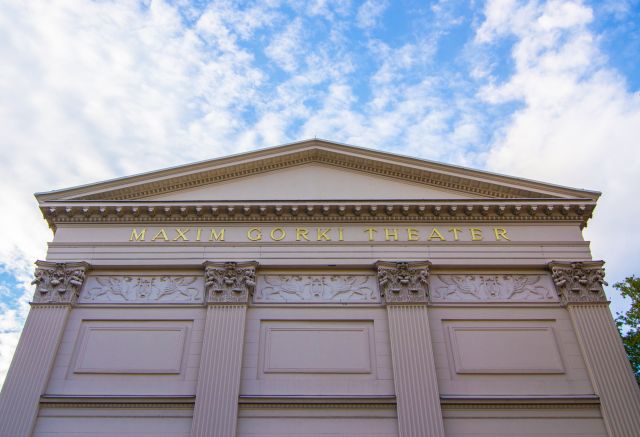The history of the Maxim Gorki Theatre
Located in the middle of Berlin, just a few steps away from Unter den Linden boulevard, behind the Neue Wache memorial, between the Palais am Festungsgraben (Palace on the Moat) and the Humboldt University, the Maxim Gorki Theatre has defined itself as a contemporary city theatre in historical surroundings since it was founded in 1952.
The history of the building, however, is much older, beginning in 1827. The director of the Singakademie zu Berlin choral academy, Carl Friedrich Zelter, tasked his friend, architect Karl Friedrich Schinkel, with the design of the first public concert hall in the capital. Audiences welcomed the “hall on the moat” with open arms, and it would soon become much more than just the first port of call for music in Berlin. In 1827 Alexander von Humboldt read from his Kosmos lectures in the Singakademie, and in 1848 the hall served as the meeting place for the Prussian National Assembly.
During the Second World War, the Singakademie was severely damaged in a bombing raid. The Soviet Military Administration in Germany already began with the reconstruction of the building in May 1945, and it was reopened as the programmatically named Maxim Gorki Theatre in 1952. Russian and Soviet theatre shaped the programming; the theatre would later premiere works of authors from the GDR.
A leading theatre of the GDR’s capital for almost four decades, today the Maxim Gorki Theatre, with its ensemble, is the smallest of the five main Berlin state theatres. Five artistic directors have shaped the theatre thus far: Maxim Vallentin (1952 – 1968), Albert Hetterle (1968 – 1994), Bernd Wilms (1994 – 2001), Volker Hesse (2001 – 2006) and Armin Petras (2006 – 2013).Shermin Langhoff has been the artistic director of the Maxim Gorki Theatre since the beginning of the 2013/14 season. She shared the artistic leadership responsibilities with Jens Hillje as co-artistic director until 2019. Beginning with the 2019/20 season she was supported by an eight-member Artistic Advisory Board. In the 2021/22 season the theatre’s leadership was restructured in connection with processes already begun in 2019. The artistic leadership team has been reinforced with Oliver Frljić. In the 2022/23 and 2023/24 season he served in an advisory capacity as artistic co-director. Johannes Kirsten has been a member of the artistic direction as head dramaturge since 2020. Together they invite you to take part in a discourse that’s as diverse as the biographies of the people who live in this city.
